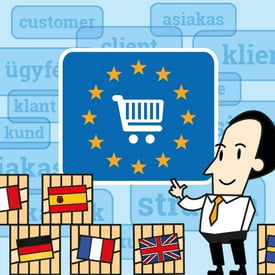
Many EU standards and policies that facilitate business and trade have been developed over the past years. However, the EU is yet to become a truly single market. Local small-medium sized companies face barriers when selling online, so do US exporters. Europe must embrace the digital revolution and open up digital opportunities for people and businesses. The European Commission believes that using the power of the EU's Digital Single Market will allow Europe to achieve this goal. This May, the European Commission introduced its detailed plans to create a Digital Single Market with the objective to combat its current online barriers in order to boost EU-wide cross-country e-commerce. This will help start-ups and small-medium sized companies to fully benefit from growth opportunities of the EU market. Subsequently, this will also allow US companies export more easily across the EU from a single central location. Country-specific regulation has been identified as the greatest barrier to a single, fully functional e-commerce market.
The Digital Single Market Strategy adopted on the 6th May 2015 includes a set of targeted actions to be delivered by the end of 2016. It is built on three pillars:
1) Better access for consumers and businesses to digital goods and services across Europe.
2) Creating the right conditions and a level playing field for digital networks and innovative services to flourish
3) Maximising growth potential of the digital economy
Commission President Jean-Claude Juncker said: "Today, we lay the groundwork for Europe’s digital future. I want to see pan-continental telecoms networks, digital services that cross borders and a wave of innovative European start-ups. I want to see every consumer getting the best deals and every business accessing the widest market – wherever they are in Europe. Exactly a year ago, I promised to make a fully Digital Single Market one of my top priorities. Today, we are making good on that promise. The 16 steps of our Digital Single Market Strategy will help make the Single Market fit for a digital age."
Highlights of benefits of the European Digital Single Market to small-medium sized companies, as well as US exporters:
- Rules to make cross-border e-commerce easier. This includes harmonized EU rules on contracts and consumer protection when you buy online: whether it is physical goods like shoes or furniture; or digital content like e-books or apps. Consumers are set to benefit from a wider range of rights and offers, while businesses will more easily sell to other EU countries. This will boost confidence to shop and sell across borders. Currently, only 7% of small-medium sized companies sell cross-border.
- Lower parcel delivery prices with more efficient delivery system. Currently, 62% of companies trying to sell online say that too-high parcel delivery costs are a barrier.
- Reduction of administrative burden businesses face from different VAT regimes: so that sellers of physical goods to other countries also benefit from single electronic registration and payment; and with a common VAT threshold to help smaller companies sell online.
Fulfillment of the above objectives will allow US companies to export to Europe more easily. Policies regarding consumer protection and privacy policy, as well as VAT regime would be standardized across the EU. Companies would no longer need to adapt each country’s consumer law.
For more information visit our sources on the European Commission website:
http://europa.eu/rapid/press-release_IP-15-4919_en.htm
http://europa.eu/rapid/press-release_MEMO-15-4920_en.htm
Below is an overview of the current EU legislation on e-commerce:
- Online purchase withdrawal rights: 14 days “cooling off” period after the goods are received. The seller must refund the full product cost and shipping costs to the customer if the goods are returned for any reason.
- Warranty rights: 2 years. Some large international companies tried to find loopholes due to differences between the country legislation and the EU directive. Substantial fines were awarded in a number of cases.
Download our ebook Ecommerce in Europe for more information on selling online in Europe.

